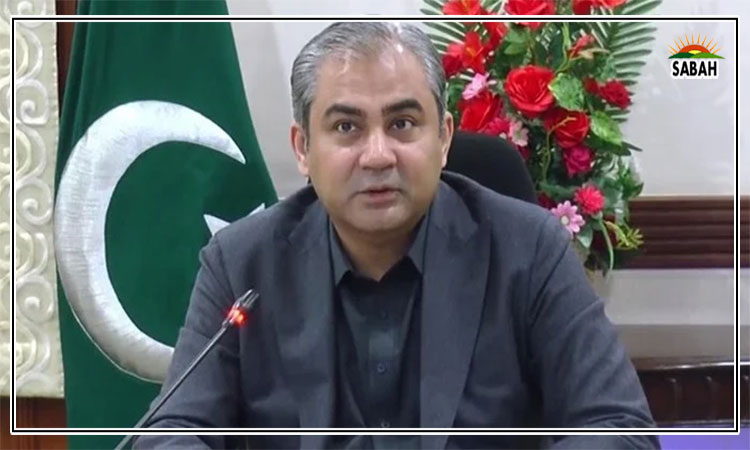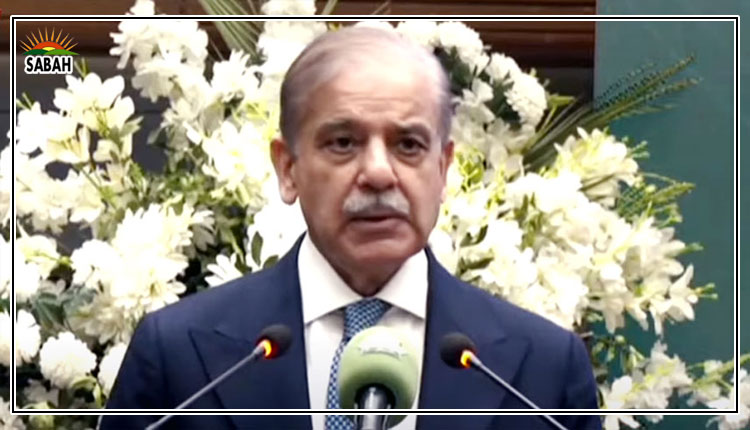PM Shehbaz stresses the need to honour IMF commitments
KARACHI, Jan 08 (SABAH): Prime Minister Mian Muhammad Shehbaz Sharif on Wednesday stressed the need to honour the International Monetary Fund (IMF) commitments, insisting that the government could not bid farewell to the programme just yet. Prime Minister Shehbaz Sharif said the main goal of the government is to convert macroeconomic stability into economic growth.
Addressing a ceremony at Pakistan Stock Market in Karachi on Wednesday, PM Shehbaz Sharif mentioned that Uraan Pakistan, a homegrown economic plan, has been launched. He said he will be sitting with the financial experts of Karachi and other cities in order to really move forward Pakistan with unity of thought and action, and achieve economic targets. He expressed his anticipation of receiving proposals to implement an export-led growth agenda and exploit the full potential of natural resources.
The Prime Minister assured the privatization process will be taken forward in an entirely transparent manner.
The premier said, “We need to honour IMF commitments — we can’t just say tata bye bye (dismiss the programme on a whim) once we take off. “We will say goodbye to it forever once the time is right,” he said.
Regarding the business community’s role, the premier insisted that the government and the business leaders needed to “build their relationship to achieve those targets”, giving the example of their tax targets. “If you look at what IMF stated [their target as]10.6 tax-to-GDP ratio, we have achieved 10.8,” he said. “It’s something to celebrate but this is not enough — this is just the beginning.”
The premier insisted that there was a need for investment now, recounting that the State Bank of Pakistan’s (SBP) interest rate went from a record-high of 22 per cent to 13pc.
“Investors here say there is still a gap of 8 points — I would want it to go to 6pc,” he stressed, “But it has to be done with an alert mind, with prudence, so we don’t get trapped in the future.
“We have to move bravely but with caution,” he added. “Regarding that, how do we actualise export-led growth? Everyone says growth should be export-led, that FDI [foreign direct investment] should be export-led so that profits come and dollars are present so we can retain them — all very well said but I need tangible proposals on how to implement export-led growth.”
Prime Minister Shehbaz Sharif went on to compare Pakistan with Saudi Arabia “in a different context to the world”, highlighting that the country had mines and minerals while Saudi Arabia had “black gold”.
PM Shehbaz Sharif insisted the country had to head towards growth, adding that he knew that critics often spoke about “the engine heating up” and “Pakistan heading towards a boom-bust cycle once again” when it came to pursuing growth. “A lot of experts have spoken and writers have written about it, but I invite you to come tell us what other way is there?” he rhetorically asked.
On the privatisation issue, the premier said that the process had been entirely transparent, citing the example of Pakistan International Airlines (PIA) which the government failed to privatise in the first attempt.
“The entire process was 100pc transparent just like Islamabad Airport, the privatisation process for which is about to be concluded in the next few days,” he said.
Deputy Prime Minister Senator Mohammad Ishaq Dar, speaking at the event, reflected on the long-term benefits of stock market integration, which began nine years ago, noting that the markets had grown into a strong foundation for the economy.
He acknowledged the struggles faced in 2017 due to political instability and the economic downturn that followed. DPM Dar also highlighted the threat of economic collapse that countries faced globally during the COVID-19 pandemic.
DPM Dar reassured business leaders not to spread despair, assuring them that the “future looked bright”. He credited PM Shehbaz’s leadership for preventing the country from economic collapse and acknowledged that Pakistan’s diplomatic isolation had ended, with increasing foreign investor confidence in the nation.
Finance Minister Muhammad Aurangzeb also spoke at the event, underscoring the importance of the stock market’s role in boosting investor confidence in the economy.
FM Aurangzeb highlighted the progress made through the IMF agreement, which had provided economic stability, and noted that reforms in struggling public-sector institutions were underway.
He also pointed to the digitalisation efforts at the Federal Board of Revenue (FBR), the need for reforms in the energy sector, and the introduction of structural reforms to improve the country’s infrastructure. FM Aurangzeb emphasized that the federal government’s efforts to reduce expenses were also making a difference in improving economic conditions.
In his remarks, the finance minister noted that a reduction in the policy rate had eased the burden of debt and interest payments.
Minister for Information and Broadcasting Attaullah Tarar Advocate, Sindh Governor Muhammad Kamran Khan Tesori and CM Sindh Syed Murad Ali Shah were also present on the occasion.












